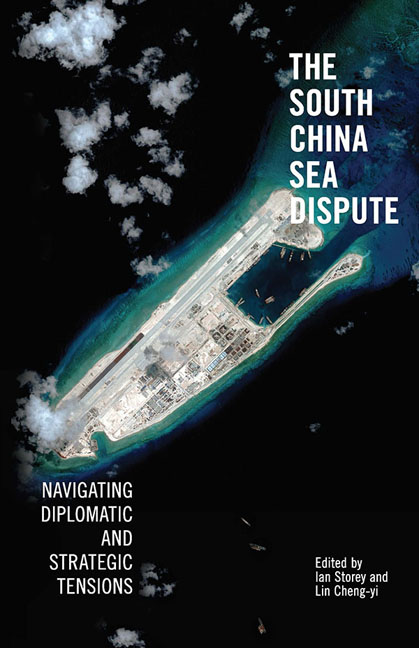Book contents
- Frontmatter
- Contents
- About the Contributors
- 1 Introduction
- 2 Untangling a Complex Web: Understanding Competing Maritime Claims in the South China Sea
- 3 China Debates the South China Sea Dispute
- 4 Taiwan's Evolving Policy towards the South China Sea Dispute, 1992–2016
- 5 The South China Sea: Primary Contradictions in China–Southeast Asia Relations
- 6 Rising Tensions in the South China Sea: Southeast Asian Responses
- 7 The Philippines and the South China Sea Dispute: Security Interests and Perspectives
- 8 A Vietnamese Perspective on the South China Sea Dispute
- 9 The South China Sea Dispute: Options for Malaysia
- 10 The United States and the South China Sea: Front Line of 228 Hegemonic Tension?
- 11 The South China Sea Dispute in U.S.–ASEAN Relations
- 12 Japan and the South China Sea Dispute: A Stakeholder's Perspective
- 13 Conclusion
- Index
13 - Conclusion
Published online by Cambridge University Press: 19 May 2017
- Frontmatter
- Contents
- About the Contributors
- 1 Introduction
- 2 Untangling a Complex Web: Understanding Competing Maritime Claims in the South China Sea
- 3 China Debates the South China Sea Dispute
- 4 Taiwan's Evolving Policy towards the South China Sea Dispute, 1992–2016
- 5 The South China Sea: Primary Contradictions in China–Southeast Asia Relations
- 6 Rising Tensions in the South China Sea: Southeast Asian Responses
- 7 The Philippines and the South China Sea Dispute: Security Interests and Perspectives
- 8 A Vietnamese Perspective on the South China Sea Dispute
- 9 The South China Sea Dispute: Options for Malaysia
- 10 The United States and the South China Sea: Front Line of 228 Hegemonic Tension?
- 11 The South China Sea Dispute in U.S.–ASEAN Relations
- 12 Japan and the South China Sea Dispute: A Stakeholder's Perspective
- 13 Conclusion
- Index
Summary
Although the authors of this volume approached the South China Sea problem from a variety of perspectives, they each identified and explored five major themes which are key to understanding the dispute and anticipating future developments.
First, all of the contributors acknowledged that due to the South China Sea's position as a major conduit of global maritime trade, peace and stability in the area, and the uninterrupted flow of seaborne commerce, are vital for the economies of all countries in the Asia-Pacific region, and indeed all states in every part of the world. Accordingly, it is in no country's interests — least of all China's, which has enjoyed phenomenal export-led growth over the past four decades — to allow tensions to escalate to the point where sea lane security in the South China Sea is undermined. Several of the authors also stressed that freedom of navigation in the semi-enclosed sea included the right to conduct military activities in the exclusive economic zones (EEZ) of coastal states, an issue which the United States and China strongly disagree on, and which is likely to exacerbate the geopolitical dimension of the dispute in the coming years. Most of the contributors agree that the economic importance of the South China Sea mitigates the prospect of a major war in the area. However, a shared concern is that a tactical miscalculation over fishing rights or hydrocarbon extraction could spark a military clash that has major strategic consequences. As such, the negotiation of effective conflict prevention and de-escalation mechanisms between and among the claimant states and other stakeholders should be a priority.
Second, that tensions in the South China Sea have experienced a dramatic upsurge since the mid-to-late 2000s is indisputable. The experts in this volume agree on many of the triggers, including: rising nationalism over disputed atolls and waters, a phenomenon which has been promoted by several governments — China and Vietnam in particular — but which is also organic and has become more pronounced due to Internet websites and social media; competition over living and non-living resources, but especially hydrocarbons despite the recent plunge in oil and gas prices…
- Type
- Chapter
- Information
- The South China Sea DisputeNavigating Diplomatic and Strategic Tensions, pp. 291 - 296Publisher: ISEAS–Yusof Ishak InstitutePrint publication year: 2016

